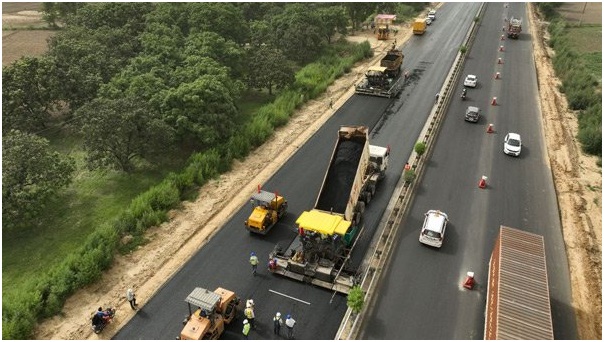In a major achievement for India’s road infrastructure, National Highways Authority of India (NHAI) constructed 100 km bituminous concrete road in a record time of 100 hours.
The laying of Bituminous Concrete took place on the Ghaziabad-Aligarh Expressway in Uttar Pradesh.
Nitin Gadkari, Minister of Road Transport & Highways, extended his congratulations to the teams of Cube Highways, L&T, and Ghaziabad Aligarh Expressway Pvt Ltd (GAEPL) for their achievement.
He attended the celebration ceremony virtually and said the Ghaziabad-Aligarh section of NH34, spanning 118 kilometres, plays a vital role as a transportation link between the densely populated regions of Ghaziabad and Aligarh.
He said this project traverses various towns and cities in Uttar Pradesh, including Dadri, Gautam Buddh Nagar, Sikandrabad, Bulandshahr, and Khurja.
It serves as a critical trade route, facilitating the movement of goods and contributing to regional economic development by connecting industrial areas, agricultural regions, and educational institutions,” he added.
The use of CCPR Technology for the highway project
Shri Gadkari emphasised the commitment to sustainability and cost-effectiveness by implementing the use of Cold Central Plant Recycling (CCPR) technology in the project.
For Cold Central Plant Recycling, a mobile cold recycling mixing plant is set up near the construction site. The materials to be recycled are brought to this plant by truck, processed, and transported back to the construction site by truck as a high-quality finished product and directly used to pave the road surface.
Cold-mix recycling technology used reclaimed asphalt pavement (RAP) materials with virgin asphalt and aggregate (if required) in a central mixing plant without the application of heat. Cold Central Plant Recycling (CCPR) can produce a high quality economical paving material preventing a valuable resource from being landfilled.
The minister said this innovative green technology involves utilizing 90% of the milled material, which amounts to nearly 20 lakh square metres of road surface. He further said consequently, the consumption of virgin materials has been reduced to a mere 10%.
‘’By adopting this approach, we have significantly reduced fuel consumption and the associated greenhouse gas emissions, thereby making a substantial contribution to lowering our carbon footprint,‘’ he further exclaimed.
The minister also expressed the government’s commitment to ensuring exceptional mobility for every commuter, promoting commerce, and driving economic activities in the region through the development of world-class highways at the fastest speed without compromising on quality.





